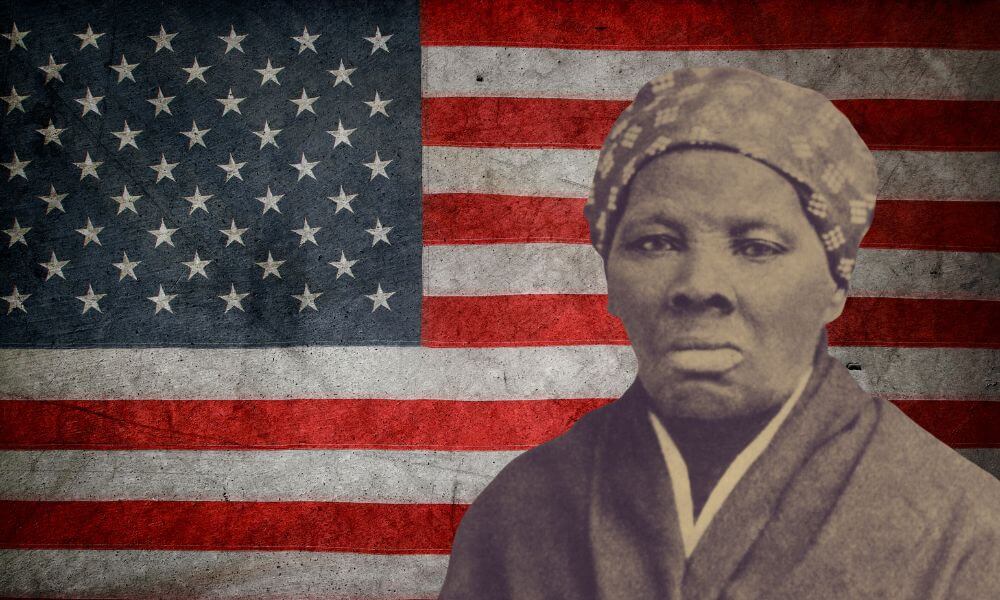Harriet Tubman spoke English, as she was born into a slave family in America. She would have spoken English as a slave and when she later escaped. Slaves in America at this time were naturally taught English, and this would have been the language she was born into. She did not learn to read or write.
Tubman is one of the most important figures in abolitionist history.
She led dozens of her enslaved brethren to freedom and was a key figure in the advancement of other important social movements such as Suffrage.
Today she is rightly regarded as one of the most important figures in Black American history.
Let’s find out more.

What was Harriet Tubman’s native language?
This is naturally a somewhat murky question, but the simplest answer is that the language she would have spoken from her earliest time was English.
She was born into a slave family owned by a family who ran a large plantation in Dorchester County, Maryland.
The exact time and place of her birth were not recorded given that she was born into slavery—it was not common practice to record slave births.
Tubman herself said the year of her birth was 1825.
Historians agree it was probably closer to 1822, based on payments made to midwives and other historical documents.
So, in that sense, Tubman always grew up speaking English and thus English would have been her native language.
However, naturally, Tubman and her direct ancestors were taken from their native homeland against their will, and thus part of her cultural and ethnic identity had been erased by the time she was born.
Historical records show that her grandmother was named Modesty, and arrived into the U.S. from Africa on a slave ship.
More than this, though, we cannot say for certain.
It was said in her childhood that she showed character traits of the Ashanti or Asante people, an ethnic group native to modern-day Ghana.
However, there is no concrete evidence for this lineage, and this is only a rumor at best.
The truth is we cannot know with any certainty what Tubman’s precise ethnic lineage was as it was erased by slave traders.
So, it is all but impossible to pin down any precise “native” language Tubman might have claimed; certainly, English was the only language she spoke.
It is a tragedy for her and all others like her who had their ethnic identity robbed from them, and thus by extension their linguistic identity, too.
Why was Harriet Tubman called Moses?
Harriet Tubman was often called Moses for the simple reason that she had led enslaved people to freedom and out of slavery.
Moses led the Israelites out of slavery in Egypt under the Pharaohs; Tubman led enslaved people in America out of slavery.
Tubman made 13 missions which resulted in the rescue of around 70 enslaved people.
She herself escaped slavery in 1849, fleeing from Maryland to Philadelphia, though she would soon return to rescue her own family.
Christian morals were naturally very important to Americans at this time, and also to many slaves and slave families.
She herself was raised Methodist, and she was devoutly religious for her whole life.
This would also have been true of most of her contemporaries, in a broader sense.
They would almost all have been Christian.
The liberation of the Israelites is naturally a very important point in Biblical history, and so it made a great analogy to the present predicament of slaves.
The nickname was first coined, as far as we can tell, by abolitionist William Lloyd Garrison, calling her “The Moses of Her People” in great reverence for the work she did.
Did Harriet Tubman teach herself to read?
Naturally, Harriet Tubman was not educated in her youth as a slave.
Throughout her life, she never learned to read or write, and would memorize Bible stories by heart.
It would have been remarkably difficult for someone in her position to learn to read or write if they had not had the opportunity as a young person.
Tubman never needed to read or write in order to carry out her rescues, and so it was never really an issue in her life that she could not read or write.
She did not teach herself to read as she was plainly far too busy with more important things.
Was Harriet Tubman Ghanaian?
This is a matter of debate, but ultimately there is no concrete evidence pointing to her having been ethnically Ghanaian.
She certainly wasn’t a Ghanaian national—such a concept did not exist in her lifetime, even if she hadn’t been born to slaves in Maryland.
As mentioned, some during her life told her that she had the characteristics of a particular group in Ghana, and modern day Ghana certainly was an area where slave traders capture people.
Harriet Tubman’s lack of certain ancestry is one of the many tragedies of slavery—the identities and histories of millions of people were carelessly erased in the name of slavery.
There are few scars on western history as deep as slavery.
Many even today wish not to acknowledge it, not to think about and not to fully consider the impact it still has on the world today.
At a time when abolitionism was by no means the prevailing sentiment, Tubman led a heroic life of helping others—first in the Underground Railroad and later as a nurse in the Civil War.
English was the language she used while doing all of this.

